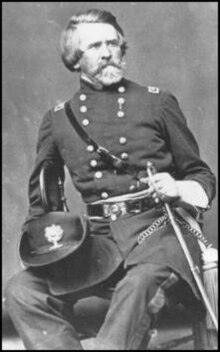Milledge Luke Bonham
Milledge Luke Bonham (born December 25, 1813 at Red Bank , South Carolina , † August 27, 1890 in White Sulfur Springs , North Carolina ) was an American politician and brigadier general of the Confederate States in the Civil War .
Early years
Bonham was born in the Edgefield District of South Carolina to Captain James Bonham and his wife Sophie, nee Smith, a niece of Captain James Butler, the head of the illustrious families of South Carolina. He received his education in private schools, he later graduated from South Carolina College , now the University of South Carolina at Columbia . Bonham served as major and as adjutant general in the South Carolina Brigade 1836 in the second Seminole War in Florida . In the same year his older brother James died defending the Alamo fortress .
Political rise
Bonham studied law, was admitted to the bar in 1837 and opened a law practice in Edgefield . During the Mexican-American War , he served as Lieutenant Colonel and Colonel in the US Army's 12th Infantry Regiment . Upon his return he became major general of the South Carolina Militia and entered politics as a member of the Democratic Party . From 1840 to 1843 he was a member of the House of Representatives from South Carolina and from 1848 to 1857 he was prosecutor for the southern area of the state. He was then elected to the 55th and 56th US Congresses , making him a member of the House of Representatives from March 4, 1857 to December 21, 1860 .
Civil war activities
In February 1861 Bonham was named major general and commander of the Army of South Carolina by Francis Wilkinson Pickens , the governor of South Carolina, and on April 19, 1861 promoted to brigadier general in the Confederate Army . From then on, he commanded the first Confederate Brigade under General Pierre Gustave Toutant Beauregard . On July 21, 1861 at the First Battle of Bull Run , he commanded his own brigade, two artillery - batteries and six Cavalry - companies .
On January 27, 1862, he left the army to return to work in the Confederate Congress , and on December 17, 1862, he was elected governor in a secret election, which he remained until December 1864.
Governor of south carolina
During his time as governor of South Carolina until December 1864, he had to deal with wartime economic difficulties. This also included a rising inflation rate and increasing war fatigue. The military setbacks of the Confederation and the increasing number of dead and wounded did not improve the mood in the population either.
In February 1865 he returned to the army as brigadier general of the cavalry . After the war, Bonham opened an insurance company in Edgefield and Atlanta , which he ran from 1865 to 1878. After his return to politics, he was re-elected to the South Carolina House of Representatives in 1865 and 1866 and held other political positions until 1874. He then withdrew from politics and continued his legal practice. From 1878 until his death he worked as a state railway commissioner.
See also
literature
- Robert Sobel and John Raimo (Eds.): Biographical Directory of the Governors of the United States, 1789–1978. Volume 4. Meckler Books, Westport, CT, 1978. 4 volumes.
- The National Cyclopaedia of American Biography. Vol. 12. James T. White & Company, New York
- David J. Eicher: The Civil War in Books: An Analytical Bibliography. University of Illinois, 1997, ISBN 0-252-02273-4
- Richard N. Current: Encyclopedia of the Confederacy. 1993, (4 vol.) ISBN 0132759918
- John H. Eicher & David J. Eicher: Civil War High Commands. Stanford University Press, 2001, ISBN 0-8047-3641-3
- Ezra J. Warner: Generals in Gray: Lives of the Confederate Commanders. Louisiana State University Press, 1959, ISBN 0-8071-0823-5
Web links
- Milledge Luke Bonham in the Biographical Directory of the United States Congress (English)
- Bonham at the National Governors Association (English)
- South Carolina Information Highway (English)
- Milledge Luke Bonham in the database of Find a Grave (English)
| personal data | |
|---|---|
| SURNAME | Bonham, Milledge Luke |
| BRIEF DESCRIPTION | Confederate Army officer and politician |
| DATE OF BIRTH | December 25, 1813 |
| PLACE OF BIRTH | Red Bank , South Carolina |
| DATE OF DEATH | August 27, 1890 |
| Place of death | White Sulfur Springs , North Carolina |


